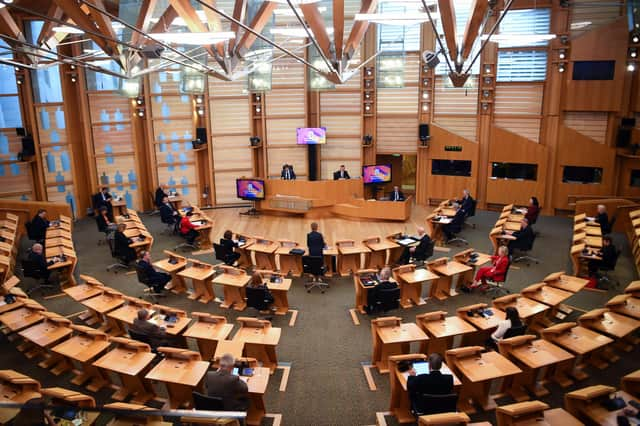Scottish Election 2021: Who will be the next Presiding Officer?


The role of Presiding Officer (PO) is similar to that of Speaker in Westminster, but with a lot less shouting for order.
While it involves chairing the proceedings within the chamber, and deciding who can speak in debates, more importantly it is the PO who is the arbiter on what legislation is within the competence of the Scottish Parliament – ie what laws can be passed in Holyrood under the powers it has as set out in the Scotland Act, and what laws are under the jurisdiction of Westminster.


Advertisement
Hide AdAdvertisement
Hide AdThis power will become increasingly important during the coming new parliamentary term as with a majority of pro-independence MSPs and with Nicola Sturgeon already declaring that any decision to hold a second independence referendum lies with the Scottish Parliament – challenging Boris Johnson to take her government to court to prove otherwise – the decision on whether the parliament can vote on any Bill which aims to hold such a constitutional vote will lie with the PO.
And while the role is impartial – the MSP elected to it has to give up their party membership – on such a matter of significance as indyref2, parties on all sides will be determined to ensure they get the Presiding Officer they want.
Outgoing PO is Ken Macintosh, who was elected as a Labour MSP in 2016, but he has not stood for re-election this time round. Two of his deputies – Labour’s Lewis MacDonald and SNP MSP Linda Fabiani have also stood down.
However SNP Midlothian South MSP, Christine Grahame, who was also a DPO in the last Parliament – known for being a stickler when it comes to the timing of speeches and the specificity of questions to ministers – is returning to Holyrood. She will also be Mother of the House, the longest serving member of the Scottish Parliament, and at 77-years-old could perhaps be keen to see out what could be her last term in the Presiding Officer’s chair.
There had been speculation the SNP, despite winning 64 MSPs in Thursday’s elections, would be reluctant to give up one of its MSPs to the role, given it might well have to depend on every single vote to pass legislation, but with eight Scottish Greens who will back it on the majority of issues, and particularly on an independence referendum Bill, then having a pro-independence PO might be seen as an administrative coup. The flip side being that Grahame is also of independent mind and may not be the friend to the government they would hope for.
On the other side of the argument, the pro-union parties will likely want to ensure that whomever sits in the PO chair, is more likely to come down on the side of the UK and retaining the constitutional status quo. Jackson Carlaw, who was briefly Scottish Conservative leader after Ruth Davidson, is believed to be interested in the post, and may well view the role as a last hurrah before leaving frontline politics, as he’ll be 67 at the next election.
Indeed only one MSP who became PO has returned to the benches, and that was Conservative Alex Fergusson – all others, Sir David Steel, George Reid and Tricia Marwick, like Ken Macintosh, stepped down after their term in the role.
However, it is hard to see Mr Carlaw winning a majority of votes in a parliament which is heavily weighted against his party.
Advertisement
Hide AdAdvertisement
Hide AdThere has yet to be a Scottish Green Presiding Officer, and with eight MSPs the party might well nominate someone from within its ranks – co-leader Patrick Harvie perhaps, which would leave the way clear for his co-leader Lorna Slater, and Holyrood group leader Alison Johnstone, to step further into the political spotlight. At the same time, the novelty of having its largest group of MSPs ever could well see the Greens sit this one out.
Scottish Labour is also unlikely to nominate anyone from within its ranks on two counts – it did so the last time, reducing its numbers to 23, and it also has a swathe of new faces looking to acclimatise to the procedures and practices of Holyrood.
Then there are the Scottish Liberal Democrats. Already reduced to a rump of just four MSPs, losing one more to the PO chair may not feel like such a wrench, given the party has already lost its automatic right to ask a question at First Minister’s Questions (you need to have a group of five MSPs for that) and will also not be able to take part in the parliamentary bureau meetings where parliamentary business is decided.
While leader Willie Rennie may not want to give up his party membership, Orkney MSP Liam McArthur, a man well-liked for his approach to consensus-working and fairness, could be the right person at the right time.
The vote to elect a new Presiding Officer takes place in Holyrood on Thursday once the MSPs have all been sworn in. It’s not first-past-the-post or even proportional representation, instead the exhaustive ballot system is used.
MSPs will cast a vote for their chosen candidate, but if no candidate is supported by an overall majority, then the MSP with the fewest votes is eliminated and another round of voting occurs. This then is repeated for as many rounds as necessary until one candidate has a majority.
It’s the perfect introduction to the intricacies of the Scottish Parliament.
A message from the Editor:Thank you for reading this article. We're more reliant on your support than ever as the shift in consumer habits brought about by Coronavirus impacts our advertisers.
If you haven't already, please consider supporting our trusted, fact-checked journalism by taking out a digital subscription.
Comments
Want to join the conversation? Please or to comment on this article.
